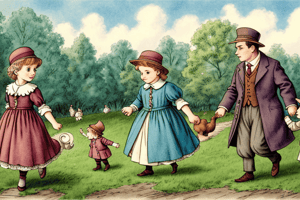Podcast
Questions and Answers
Which of the following is NOT a responsibility of children?
Which of the following is NOT a responsibility of children?
- To report the employer if forced to work
- To have a birth certificate (correct)
- To obey school and class rules
- To study and learn
What right does a child have regarding their identity?
What right does a child have regarding their identity?
- To change their nationality at will
- To be adopted without consent
- To have a guardian choose their name
- To have a name and nationality (correct)
Under what circumstance can children under 16 be detained?
Under what circumstance can children under 16 be detained?
- There are no circumstances for this (correct)
- If they commit a minor crime
- If they are not attending school
- If they are working in a factory
Which institution is NOT typically involved in protecting children's rights?
Which institution is NOT typically involved in protecting children's rights?
Which of the following represents a right related to safety for children?
Which of the following represents a right related to safety for children?
What is defined as gender-based violence?
What is defined as gender-based violence?
Which of the following is NOT an example of gender-based violence?
Which of the following is NOT an example of gender-based violence?
How many members are in the National Assembly of Namibia?
How many members are in the National Assembly of Namibia?
What is one primary function of the National Council?
What is one primary function of the National Council?
Which branch of government is responsible for making laws in Namibia?
Which branch of government is responsible for making laws in Namibia?
What significant responsibility is held by the President of Namibia?
What significant responsibility is held by the President of Namibia?
Which is NOT a consequence of breaking the laws?
Which is NOT a consequence of breaking the laws?
What is a major reason for the importance of laws in a country?
What is a major reason for the importance of laws in a country?
What role does the Prime Minister of Namibia fulfill?
What role does the Prime Minister of Namibia fulfill?
Which component of the government is NOT part of Namibia's structure?
Which component of the government is NOT part of Namibia's structure?
Flashcards are hidden until you start studying
Study Notes
Children’s Rights
- Children have the right to education and access to schooling.
- Children have the right to care and support from adults.
- Children have the right to safety and protection.
- Children have the right to have a name and nationality, documented with a full birth certificate.
- Children under 14 years old are prohibited from working in factories or mines.
- Forced labor, including on farms or at other workplaces, is not allowed for children.
- Children under 16 years old cannot be detained.
Children's Responsibilities
- Children have the responsibility to study and learn.
- Children have the responsibility to complete homework assignments.
- Children have the responsibility to attend school.
- Children have the responsibility to obey school and class rules.
- Children have the responsibility to help and care for each other.
- Children have the responsibility to take precautions to ensure their safety.
- Children have the responsibility to take care of their birth certificate. It is important to never lie about their age.
- Children should not apply for work in factories or mines.
- Children should report any employer who forces them to work.
- Children should never commit any crimes.
Organizations That Protect Children's Rights
- Hospitals (Nurses)
- Lifeline/Childline organization (Social workers)
- Centers for the abused (Social workers)
- Police stations (Police men/women)
- Schools (Principals/teachers/teacher counsellors)
- Churches (Pastors)
- Foster homes (Community members)
Gender-Based Violence
- Harmful actions directed towards individuals due to their gender.
- Examples include: beating, forced marriage, bullying, rape, sexual harassment, sexual abuse, and molestation.
Namibia's Government Structure
- Composed of three branches: Executive, Legislative, and Judiciary.
Legislative Branch: Parliament
- Consists of the National Assembly and National Council.
National Assembly
- 104 members: 96 elected, 8 appointed by the President.
- Members represent political parties and serve five-year terms.
National Council
- 42 members: three elected from each of the 14 Regional Councils.
- Members serve six-year terms.
Functions of the National Assembly (Parliament)
- Lawmaking for the country.
- Budget approval.
- Advising the President.
Functions of the National Council
- Reviewing bills passed by Parliament.
- Recommending regional needs.
- Advising Parliament.
Importance of Laws
- Ensuring safety and protection of individuals.
- Protecting natural resources.
- Maintaining peace within the country.
Consequences of Breaking Laws
- Fines (monetary payment).
- Prison sentences.
President's Responsibilities
- Head of state and government.
- Head of the army.
- Appointing ministers, judges, and ambassadors.
- Signing agreements with other countries.
- Overseeing cabinet meetings.
Prime Minister's Responsibilities
- Leader of the government in Parliament.
- Head of all ministries and oversees their work.
- Advising and assisting the President.
Studying That Suits You
Use AI to generate personalized quizzes and flashcards to suit your learning preferences.




